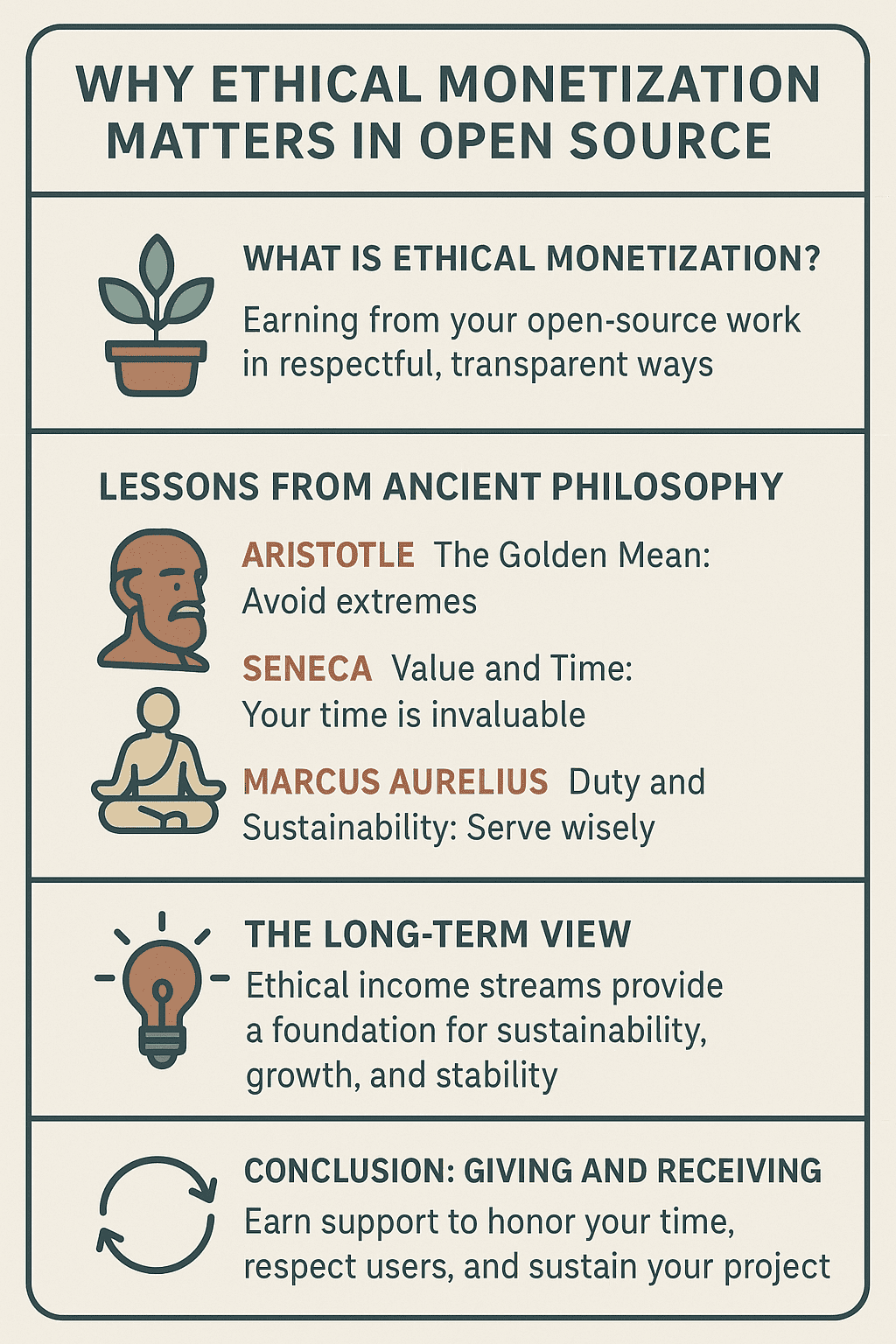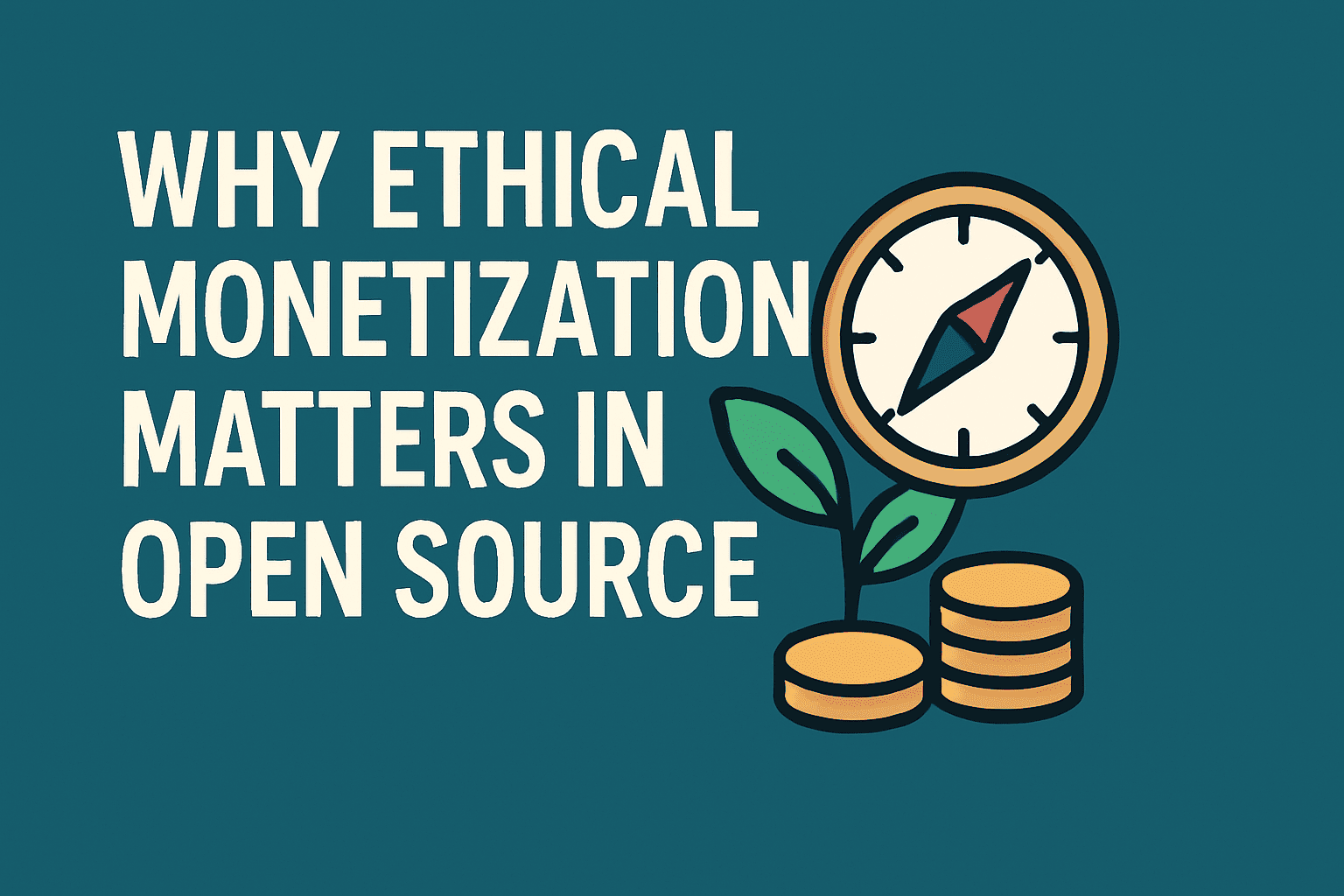Open-source development is frequently characterized by a spirit of volunteerism, with developers generously contributing their time, code, and creative output without direct compensation. However, the sustainability of open-source projects can become challenging as they scale. Increased project complexity brings greater responsibilities, escalating infrastructure costs, and the potential for developer burnout.
Ethical monetization addresses these challenges. It is not about transforming open-source projects into commercial enterprises; rather, it’s a strategy for ensuring the long-term viability and continued impact of these projects.
🌱 What is Ethical Monetization?
Ethical monetization entails deriving income from open-source work in a manner that upholds user respect, maintains transparency, and fosters sustainable growth.
This involves business models and practices that differ from traditional commercial approaches.
Specifically, it means:
- Avoiding intrusive advertising: Ensuring that revenue generation does not compromise the user experience through disruptive or excessive advertisements.
- Protecting user data: Refraining from the sale or misuse of user data, thereby safeguarding user privacy.
- Preserving essential features: Ensuring that core functionalities remain accessible to all users, rather than being restricted behind paywalls.
Instead, ethical monetization emphasizes:
- Transparent sponsorships: Establishing clear and open relationships with sponsors, such as through platforms like gitAds and GitHub Sponsors, where the support is acknowledged and aligned with project values.
- Offering value-added extras: Providing supplementary products or services, such as enhanced documentation, priority support, or additional features, to users who are willing to pay a premium.
- Cultivating community support and donations: Encouraging voluntary contributions from the user community through donations or crowdfunding, fostering a sense of shared investment in the project’s success.
In essence, ethical monetization is about establishing a balanced exchange: contributors provide valuable resources, and they receive support in a way that is fair and sustainable.
🧠 Lessons from Ancient Philosophy
The principles of ethical monetization find resonance in the wisdom of ancient philosophers, who explored concepts of balance, purpose, and value:
- Aristotle – The Golden Mean: Aristotle’s concept of the “Golden Mean” emphasizes the importance of moderation and balance. In the context of open-source monetization, this translates to avoiding the extremes of exploitative practices and unsustainable self-sacrifice. Ethical monetization seeks a middle path that ensures both the project’s financial health and the well-being of its contributors.
- Seneca – Value and Time: The Stoic philosopher Seneca stressed the irreplaceable nature of time, stating, “Time is the one thing that can’t be bought back.” For open-source developers, time is a critical resource. Ethical monetization acknowledges the value of their time and effort, ensuring that contributors receive fair compensation, which, in turn, promotes the long-term sustainability of their contributions.
- Marcus Aurelius – Duty and Sustainability: The Stoic emperor Marcus Aurelius spoke of the importance of fulfilling one’s duty to the community. Ethical monetization enables developers to sustain their contributions over the long term, preventing burnout and ensuring the continued availability of valuable resources to the community. It’s a pragmatic approach to serving the community effectively and responsibly.
💡 The Long-Term View
The open-source ecosystem faces a significant challenge in the long-term sustainability of its projects. Many projects, despite their initial promise and community support, eventually falter or disappear due to a lack of resources, developer burnout, or an inability to secure funding.
Establishing ethical income streams is crucial for addressing this challenge. Mechanisms such as gitAds, GitHub Sponsors, and community funding provide the necessary resources to ensure:
- Sustainability: Consistent funding enables ongoing maintenance, bug fixes, and feature development, ensuring the project’s continued viability.
- Growth: Reliable funding allows projects to expand their scope, improve their infrastructure, and attract new contributors.
- Stability: A stable financial foundation provides developers with the security to dedicate their time and expertise to the project, fostering a more predictable and reliable development process.
Ethical monetization, therefore, is not merely a means of generating revenue; it’s a strategic investment in the long-term health and vitality of open-source projects, empowering developers to build and serve their communities effectively.
🔄 Conclusion: Giving and Receiving
Open source is fundamentally built upon the principle of generosity. Developers freely give their time and skills to create valuable resources for the benefit of all. However, it’s equally important to recognize that giving should not come at the expense of the giver’s well-being or the project’s future.
Ethical monetization provides a framework for balancing the act of giving with the need for sustainability. It enables developers to:
- Honor their time: Receive fair compensation for their work, acknowledging the value of their contributions.
- Respect their users: Generate revenue in ways that do not compromise the user experience or exploit user data.
- Sustain their projects: Secure the resources necessary for the long-term maintenance, growth, and stability of their projects.
As Seneca wisely observed, “He who gives while expecting nothing still deserves to receive.” By embracing ethical monetization, the open-source community can ensure that its contributions are both valued and sustainable, allowing its code to serve, its work to be recognized, and its passion to endure.


